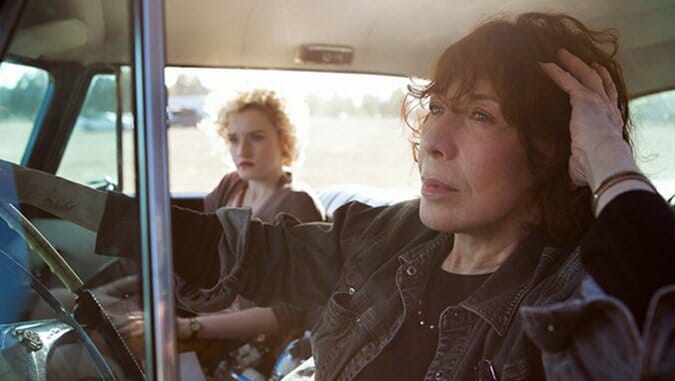Grandma

Grandma is a consistently, modestly pleasant little indie. A snapshot of a life taken over the course of one day, the latest comedy-drama from writer-director Paul Weitz captures the small bits of sadness that fill up the margins of most people’s existence. That doesn’t mean Grandma is particularly profound or original, but it’s time memorably spent.
Lily Tomlin stars as Elle, a 70-something lesbian poet who, this particular morning, is reeling. She has just broken up with her much younger girlfriend Olivia (Judy Greer), but we suspect that the melancholy goes deeper, to the death of her long-term partner Violet 18 months ago—a shattering experience that appears to have left her permanently unsteady. Not that you can tell at first: With her sharp tongue and brusque manner, Elle gives off the impression of being a person who sees through other people’s nonsense, not having time for their self-delusion or foolishness.
Soon after a teary Olivia departs Elle’s Los Angeles home, Elle is visited by her 18-year-old granddaughter Sage (Julia Garner), who tells her that she needs $600 dollars for an abortion she’s scheduled to have later that day. Elle doesn’t have the money—she doesn’t even own a credit card—and so Grandma becomes the two characters’ journey to find someone who might be able to loan them the dough.
For a movie whose plot revolves around an abortion, Grandma is refreshingly low-key, sidestepping hot-button topicality for a matter-of-fact depiction about all sorts of choices and how people learn to live with them. Weitz, working from his first original screenplay since 2006’s American Dreamz, settles his characters into a comfortable, familiar groove: Elle and Sage visit a person from Elle’s past, some new details about Elle’s past are revealed, and then the duo move on to the next person on their list. As nuanced and delicate as these encounters are, Weitz preferring a lifelike breeziness in the exchanges, Grandma nonetheless exudes a certain movie-magic artificiality. None of Elle’s stops are simple affairs, with each new player in the drama having some sort of unresolved issue with Elle that conveniently comes into the light once she steps through the door.
But it’s a testament to Grandma that such a potentially repetitive structure yields so many grace notes. At one point, Elle and Sage visit Karl (Sam Elliott), a former lover of Elle’s who Sage doesn’t know. Through the young woman’s eyes, we see a lifetime of unspoken sentiments play out in only a few scenes—and even if the revelations are somewhat predictable, Tomlin and Elliott bring such calm authority to their roles that they put flesh and pain on their characters’ complicated history. Earlier, she seeks out an old friend, a tattoo artist named Deathy (Laverne Cox) and, eventually, resigns herself to talking to her daughter and Sage’s mother Judy (Marcia Gay Harden). Along the way, some mysteries about Elle are explained: why she had a child with a man; why she loves her granddaughter but is scared of her daughter; why she’s broke; and, perhaps, why she’s such a proud card-carrying grump.
-

-

-

-

- Curated Home Page Articles By Test Admin October 21, 2025 | 3:10pm
-

- Curated Home Page Articles By Test Admin October 21, 2025 | 2:57pm
- Urls By Test Admin October 21, 2025 | 2:57pm
- Curated Home Page Articles By Test Admin October 21, 2025 | 2:55pm
-

-

-

-

-

-

-

-

-

-

-

-

-

-

-

-

-

-

-

-

-

-

-

-

-

-

-

-

-

-

-




































